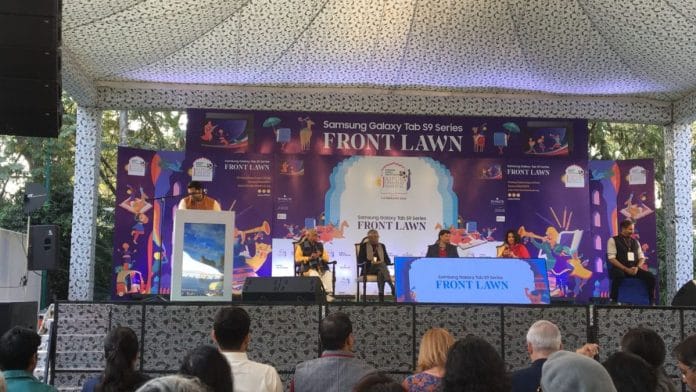Jaipur: A Rashtriya Swayamsevak Sangh (RSS) pracharak, a career diplomat-turned-politician and a Sahitya Akademi award winner walk onto a stage. Identity defines geography, insists the pracharak. Geography identifies a civilisation, asserts the politician. The voice heard next is that of the poet declaring that within geography is a space made entirely of “memory and narratives”.
What follows is a rather fluid, but mostly amicable, discussion on geographical identity, nation-state, decolonisation, equality and caste that concludes with the RSS pracharak making a rather bold claim: “Had Jesus (Christ) been in India, he would’ve never been crucified.”
The stage in question was the Front Lawn at the 17th edition of the Jaipur Literature Festival and the participants in this discussion held Friday were RSS joint general secretary Manmohan Vaidya, former foreign secretary Pavan Varma and Sahitya Akademi award-winning poet Badri Narayan.
Moderator Mandira Nayar kicked off the panel discussion by pulling the pin out of the ‘India-Bharat’ grenade and hurling it towards the three participants.
Vaidya was the first to make his argument, stating that Bharat has had a “special identity” around the world for centuries because its “way of life is spirituality-based, holistic and integral”.
“People from Bharat travelled around the world for trade but did not colonise or convert them or run down their resources, neither did they enslave and trade those people (as slaves) like the Europeans did,” he added.
Varma was next. He opened by saying that he believed that there was no contradiction between India and Bharat. “The truth is one, wise people call it by different names,” he submitted.
Asked to make his opening argument, Narayan shared an anecdote with the audience: prime minister Jawaharlal Nehru once went to Etawah in Uttar Pradesh and asked a man there what was his definition of a country; a country is whatever as far as the eye can see, the man replied.
“Calcutta (Kolkata) was once called videsh (foreign) in Bhojpur,” joked Narayan, explaining that more and more communities in India’s rural hinterlands begin to identify with a country as and when their exposure to education empowers them to grasp the concept of a nation-state.
The participants then pivoted to whether colonial rule had altered the Indian identity, with Vaidya underlining the need for fellow citizens to “decolonise” their minds.
Varma jumped in and appealed to all like-minded Indians to not rake up “religious frenzy” like the one unleashed during the Partition. He then recited the “definition of Ram Rajya”, as mentioned in Tulsidas’s Ramcharitmanas, and reminded the audience about Vinayak Damodar Savarkar’s body of work aimed at affecting reforms in Hinduism.
In discussing caste-based discrimination, it is crucial to highlight the systemic issues within educational institutions, where students from SC, ST, and OBC communities often face significant challenges. This is evident in the article on SC, ST, OBC representation in Indian education, which sheds light on the dismal representation and the upper-caste nexus that persists in these spaces.
Soon after, the discussion moved to the prevalence of caste-based discrimination in 21st-century India. This is when Badri Narayan made the argument that the Covid-19 pandemic disrupted caste dynamics in India.
Vaidya said caste discrimination should go “lock stock and barrel”, adding that though the Sangh “supports inter-caste marriages, even today 90 percent of all marriages in India are solemnised within the caste and as a result, divorce rates here in Bharat are lower.”
‘Muslims and Christians come to RSS shakhas’
Towards the end of the discussion, Vaidya elaborated his argument that Bharat has always been characterised by an openness to embrace different views.
“This is our legacy. Ninety-nine percent of people here have converted (to other religions). If the Muslims of Indonesia can consider Ram their ancestor even after changing their religion (while also) following their own religion, the people here can also do it,” he said.
“Muslims and Christians come to RSS shakhas…as Hindus, we don’t believe in conversions so they continue to follow the same faith.”
Vaidya, whose father M.G. Vaidya was one of RSS’s stalwart ideologues, then cites the argument Vivekanand made at the Parliament of the World’s Religions in Chicago in 1893 that his country was one where the “divine language Sanskrit has no word for exclusion”.
He added that Vivekanand’s disciple, Sister Nivedita, wrote in her book that the Italian Giordano Bruno — who was accused of heresy and burned alive in 1600 for questioning the core Christian beliefs prevalent at the time — would’ve never met the same fate had he been in India.
The same applies to Galileo, who was forced to renounce his belief in a heliocentric model of the universe to avoid being burned at the stake, Vaidya added, quoting her.
“She hasn’t written this. I am adding this, had Jesus Christ been in India, he would’ve never been crucified. Saying something different wouldn’t have amounted to blasphemy. That is the legacy of Bharat,” he said, before making his final submission that every resident of Bharat is a “Hindu”.
(Edited by Richa Mishra)
Also Read: Mini JLFs sprouting across India. Lit fest boom in Nagpur, Ranchi, Kanpur, Indore, Kokrajhar







A mischievous interference into christian affairs. A pseudo intellectual of no worth but his calculated remarks on minorities. A devil in disguise fermenting acrimony and hate.